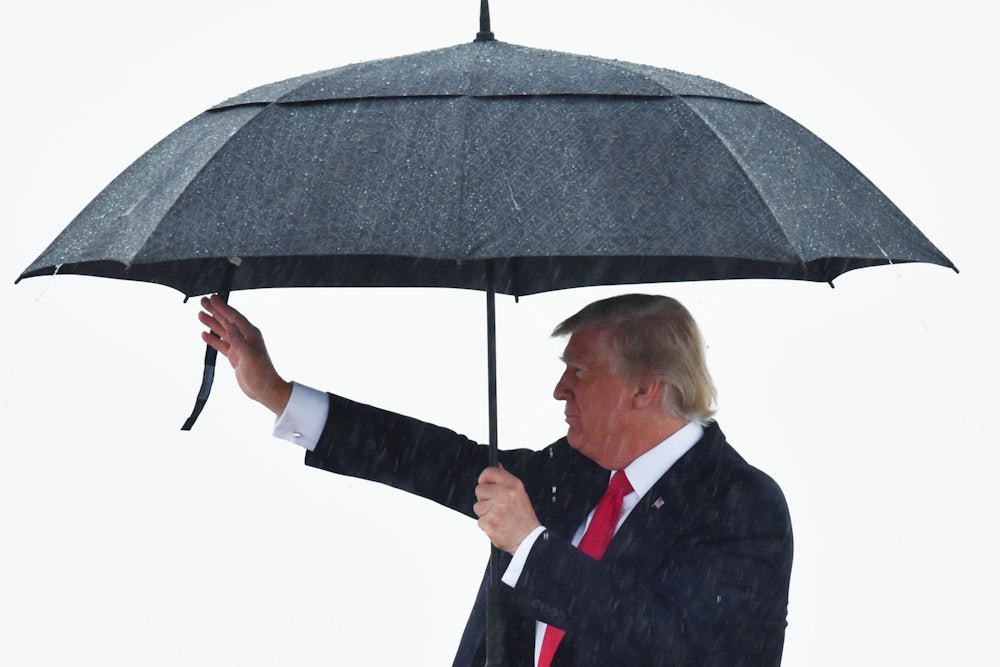The latest and hopefully final failure of Trumpcare has exposed, in the most clarifying fashion yet, the extent to which the American government is operating without a real president, or perhaps with something like an anti-president, at the helm. The environment in which the legislation collapsed, and President Donald Trump’s reaction to it, have little if any historical precedent, and confront the other institutions of government, in all their dysfunction, with the very kind of existential crisis Trump’s critics feared and warned he would provoke.
It is not an exaggeration to say that the viability of the American government now depends on public servants, including elected officials in Trump’s own party, to behave as if his legitimacy cannot be presumed.
Fortunately, there are mounting indications that the actors who will determine whether the government survives the crisis, including the somnambulant leaders of the GOP, are awakening to the scope of the threat and know how to beat it back—either by forcing Trump to comply with the duties of his job, or by more or less expropriating the powers of the president from him one by one as the president seeks to abuse them.
If a new HealthCare Bill is not approved quickly, BAILOUTS for Insurance Companies and BAILOUTS for Members of Congress will end very soon!
— Donald J. Trump (@realDonaldTrump) July 29, 2017
Unless the Republican Senators are total quitters, Repeal & Replace is not dead! Demand another vote before voting on any other bill!
— Donald J. Trump (@realDonaldTrump) July 29, 2017
These two tweets contain three distinct threats, each more potentially destabilizing than the preceding one.
First: Trump is threatening to abrogate a federal obligation under the Affordable Care Act to subsidize insurance companies that cover low income beneficiaries—a step that would approximate the impact of the most recent failed Obamacare repeal bill. He is promising, in other words, to sabotage insurance markets, exploding premiums and driving issuers out of the market, unless the Senate passes legislation to uninsure millions of people in its own way.
Second: Trump is threatening to withdraw an Obama administration rule that allowed members of Congress and their aides to port their federal premium contributions into the D.C. insurance exchange, so that, like most employees of large organizations, they aren’t forced to bear the full cost of their health benefits. On a first-order level, this is obviously less harmful than the threat to millions of unsuspecting private citizens, but the worst potential second-order effects—massive brain drain on Capitol Hill, the paralyzing impairment of an understaffed legislature—would be catastrophic.
Third, Trump is hinting at a new standard, under which he will veto all legislation Congress passes until the Senate passes a health care repeal bill.
On Sunday his budget director, Mick Mulvaney, clarified that it is the “official White House position” that Congress should not move on to any other issue until the health care process gets underway again.
Ignore for now the clownish jawboning, as if the White House can dictate the legislative calendar, or the fact that the president is the kind of simple-minded autocrat who might actually think he can fire Mitch McConnell, the Senate majority leader. Set aside as well the silver-lining implication that Trump will not sign regulatory rollback bills or regressive tax cuts into law in a fit of pique.
The truth is that Trump does have some leverage over Congress, and there is a short, straight line from this threat to the threat that Trump will veto all legislation—including must-pass bills like annual appropriations, and an extension of the debt limit—until the Senate restarts the health care repeal process. It is against the backdrop of his reflexive need to avenge his humiliations with mindless vandalism that Trump has fired his chief of staff and replaced him with a retired military general who has authoritarian tendencies of his own.
The challenge posed to Congress is thus to guarantee the integrity of the government by overriding Trump’s impulses with veto-proof majorities. Congress can frustrate Trump’s thuggish ambitions by codifying the health insurance cost-sharing payments, congressional-staff health benefits, and the borrowing authority needed to avoid a default on the debt. They just may need enormous super-majorities in both the House and Senate to do so.
It’s hard and maybe foolish to take solace in the hope that Trump’s enablers in the Republican Party, the ones who have abdicated most oversight, will suddenly take charge of the government in loco presidentus. But there are signs that Republicans in Congress are reaching a breaking point. They may continue to turn a blind eye to Trump’s corruption, but they are taking meaningful steps, in concert with Trump subordinates in the executive branch, to slow his authoritarian slide.
Congress stripped Trump of his discretion over Russian sanctions with huge, veto-proof majorities. The chairman of the Senate Judiciary Committee declared that he would not conduct any confirmation hearings this year for an attorney general nominee, should Trump edge out Jeff Sessions as a prelude to quashing the Justice Department’s Russia investigation. Trump’s defense secretary, James Mattis, is essentially ignoring a presidential proclamation (issued via Twitter) banning transgender Americans from serving in the military.
It is impossible to extrapolate from these meaningful rebellions whether Republicans in Congress will allow Trump to harm the citizenry or plunge the global economy into disarray. But we know it’s in their power to stop him, which means they will be complicit if Trump blunders ahead vindictively anyhow.
